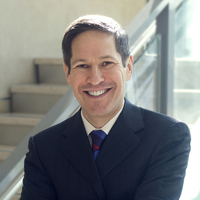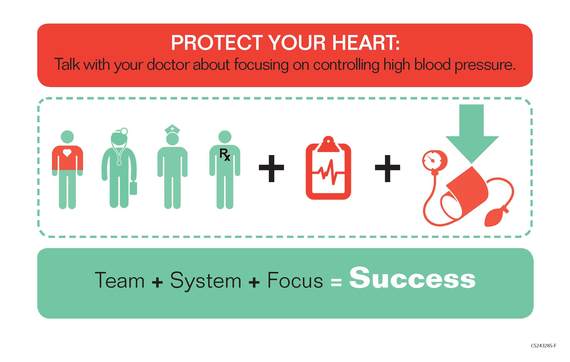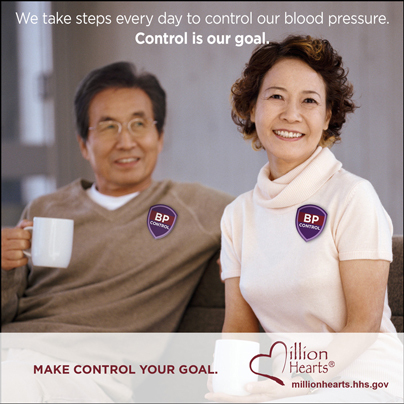There's some major news in the cardiovascular world that I want to make sure you've heard: Doctors just received new recommendations for the best ways to care for your heart.
Like an update to your computer's operating system or a rule change in your favorite sport, the revised guidelines for treatment and prevention of cardiovascular diseases and stroke recently were announced to the medical community. These recommendations help guide doctors as they work to protect their patients from heart disease (the No. 1 killer of Americans) and stroke (the No. 4 killer).
As you can imagine, a long, intense process went into creating something so important. Years of research were invested in studies, followed by countless hours by countless experts reviewing that research. I'm proud to say that my organization, the American Heart Association, and the American College of Cardiology released these guidelines, at the behest of the National Heart, Lung, and Blood Institute, which originally sponsored them.
So, you're probably wondering, "What does this mean for me?"
Here are some of the main points:
- There's a new approach for fighting cholesterol-related risks -- About 33 million Americans don't have cardiovascular disease, but -- based on their cholesterol level -- they have at least a 7.5 percent chance of a heart attack or stroke. For them, cholesterol-lowering medicines (statins) are a good idea. Previously, the medicine was recommended for anyone facing at least a 20 percent risk of heart attack alone.
Better way to figure your chances of a heart attack, stroke -- There's a new formula behind the "risk calculator," which computes the likelihood that you'll have a heart attack or stroke in the next 10 years, and a separate equation for your lifetime risk. Also, for the first time, doctors can calculate risks of heart disease and stroke specifically for African-Americans, who face disproportionate risks. If you're carrying extra pounds... -- Anyone with even a single risk obesity-related risk factor (such as elevated blood pressure or high triglycerides) can benefit from losing weight; previously, it took two risk factors to trigger a red flag. Watch what you eat (most of the time) -- If your diet is filled with heart-healthy foods, it's OK to have sweets now and then. The emphasis should be the big picture, not the occasional indulgence. Try finding time to walk around the block every other day -- Just 40 minutes of moderate to vigorous aerobic exercise three to four times a week is enough to help most people.Like the previous examples of an updated operating system or a new sports rule, these are incremental changes -- not monumental shifts. In most cases, they offer smart, simple things you can do to live better and longer.
One thing that would help in every area is controlling your blood pressure. Far too many Americans have high blood pressure or are closing in on it (prehypertension). So I've asked Dr. Tom Frieden, the Director of the U.S. Centers for Disease Control and Prevention, to continue the vital conversation on the topic of blood pressure, and about the Million Hearts initiative created to prevent heart attacks and strokes.

High blood pressure. It's called the "silent killer" because so often there are no symptoms. You don't feel bad, so how serious can it be?
But high blood pressure contributes to nearly 1,000 deaths a day, including deaths from heart attack and stroke.
Nearly 1 in 3 adults have high blood pressure. For about half of them, their blood pressure isn't controlled.
Are you one of the 35 million adult Americans whose high blood pressure isn't under control?
Maybe you're the wife, husband, daughter or son of someone who hasn't yet been able to maintain a healthy blood pressure.
Controlling high blood pressure takes time. Some of us can do it with healthy eating and increasing physical activity, but for most, medications are required. It may take time for your doctor to find the right medicine, or medicines, and the right dose for the most effective treatment.
It's a partnership that needs you, your doctor and a whole team including nurses and pharmacists.

Our Million Hearts project has learned some important lessons from health care teams around the country that have successfully helped the vast majority of their patients with high blood pressure get it under control.
What are they doing right to prevent heart attacks and strokes? And what can your doctor -- and you -- do to get the same results?
In 2012, CDC and Million Hearts recognized Ellsworth Medical Clinic in rural Wisconsin and Kaiser Permanente Colorado in Denver for excellence in achieving blood pressure control. Their three steps to control are:
- Pay attention to high blood pressure with every patient at every visit.
Use health information technology to build a list of patients with high blood pressure, set automatic reminders for follow-up and alerts when treatment isn't working and needs to be adjusted, and give feedback to the team when patients are improving -- and when they aren't. Get everyone working together to control blood pressure -- doctor, nurse, medical assistant, pharmacist and, yes, the patient, too. Taking this kind of focused approach to blood pressure control is so important that the American Heart Association, the American College of Cardiology, and CDC have issued a call to action to every doctor, practice, and health care system: Adopt and use an evidence-based high blood pressure treatment approach to help patients get blood pressure under control and prevent heart attacks and strokes.
To support this new recommendation, Million Hearts has provided sample protocols and a template to build a custom protocol. Your doctor can choose from the samples, or build a custom protocol based on the evidence.
What can you do? Talk to your doctor.
Tell her or him you want to get your blood pressure under control and you're ready to do your part to follow the protocol. Ask how your doctor and your health care team will support you in your goal.
You'll take a big step toward protecting your heart. And you'll be part of helping get the blood pressure of 10 million more Americans under control.
Tom Frieden, MD, MPH, is Director of the Centers for Disease Control and Prevention

Our 2024 Coverage Needs You
It's Another Trump-Biden Showdown — And We Need Your Help
The Future Of Democracy Is At Stake
Our 2024 Coverage Needs You
Your Loyalty Means The World To Us
As Americans head to the polls in 2024, the very future of our country is at stake. At HuffPost, we believe that a free press is critical to creating well-informed voters. That's why our journalism is free for everyone, even though other newsrooms retreat behind expensive paywalls.
Our journalists will continue to cover the twists and turns during this historic presidential election. With your help, we'll bring you hard-hitting investigations, well-researched analysis and timely takes you can't find elsewhere. Reporting in this current political climate is a responsibility we do not take lightly, and we thank you for your support.
Contribute as little as $2 to keep our news free for all.
Can't afford to donate? Support HuffPost by creating a free account and log in while you read.
The 2024 election is heating up, and women's rights, health care, voting rights, and the very future of democracy are all at stake. Donald Trump will face Joe Biden in the most consequential vote of our time. And HuffPost will be there, covering every twist and turn. America's future hangs in the balance. Would you consider contributing to support our journalism and keep it free for all during this critical season?
HuffPost believes news should be accessible to everyone, regardless of their ability to pay for it. We rely on readers like you to help fund our work. Any contribution you can make — even as little as $2 — goes directly toward supporting the impactful journalism that we will continue to produce this year. Thank you for being part of our story.
Can't afford to donate? Support HuffPost by creating a free account and log in while you read.
It's official: Donald Trump will face Joe Biden this fall in the presidential election. As we face the most consequential presidential election of our time, HuffPost is committed to bringing you up-to-date, accurate news about the 2024 race. While other outlets have retreated behind paywalls, you can trust our news will stay free.
But we can't do it without your help. Reader funding is one of the key ways we support our newsroom. Would you consider making a donation to help fund our news during this critical time? Your contributions are vital to supporting a free press.
Contribute as little as $2 to keep our journalism free and accessible to all.
Can't afford to donate? Support HuffPost by creating a free account and log in while you read.
As Americans head to the polls in 2024, the very future of our country is at stake. At HuffPost, we believe that a free press is critical to creating well-informed voters. That's why our journalism is free for everyone, even though other newsrooms retreat behind expensive paywalls.
Our journalists will continue to cover the twists and turns during this historic presidential election. With your help, we'll bring you hard-hitting investigations, well-researched analysis and timely takes you can't find elsewhere. Reporting in this current political climate is a responsibility we do not take lightly, and we thank you for your support.
Contribute as little as $2 to keep our news free for all.
Can't afford to donate? Support HuffPost by creating a free account and log in while you read.
Dear HuffPost Reader
Thank you for your past contribution to HuffPost. We are sincerely grateful for readers like you who help us ensure that we can keep our journalism free for everyone.
The stakes are high this year, and our 2024 coverage could use continued support. Would you consider becoming a regular HuffPost contributor?
Dear HuffPost Reader
Thank you for your past contribution to HuffPost. We are sincerely grateful for readers like you who help us ensure that we can keep our journalism free for everyone.
The stakes are high this year, and our 2024 coverage could use continued support. If circumstances have changed since you last contributed, we hope you'll consider contributing to HuffPost once more.
Already contributed? Log in to hide these messages.



